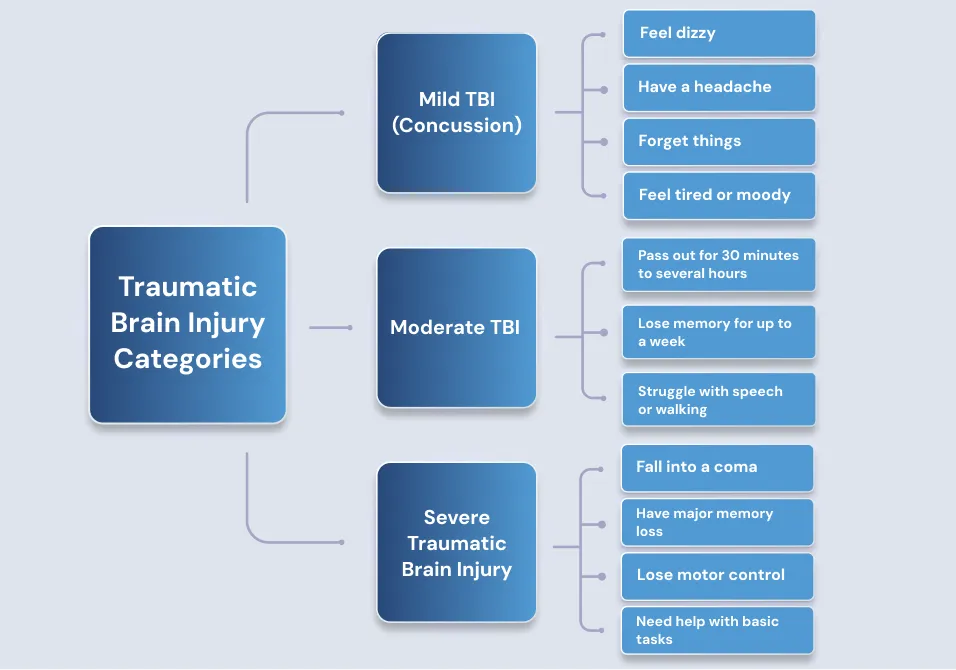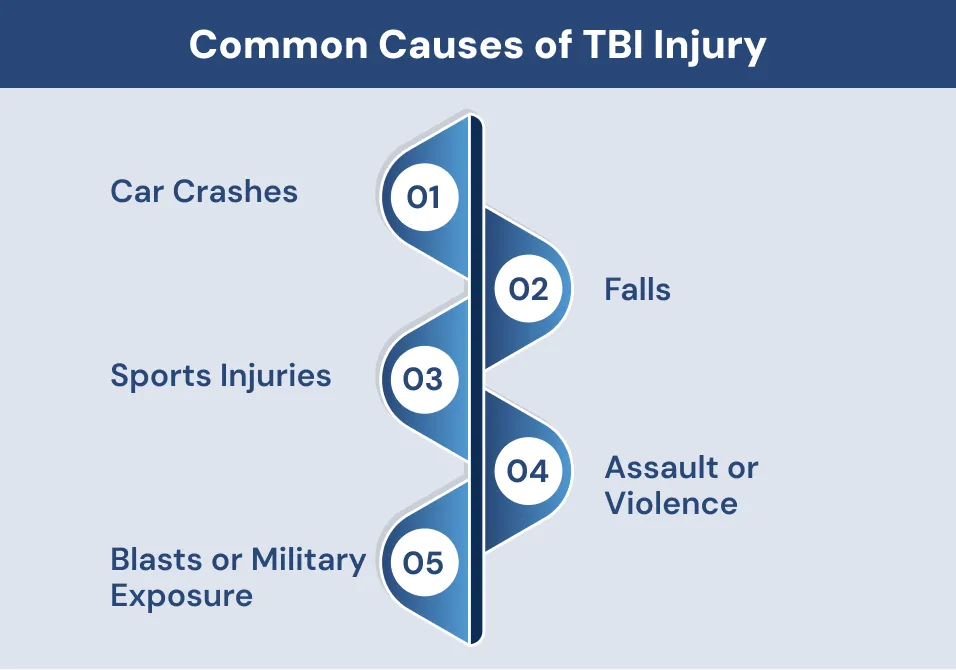What Is TBI and Why It Matters
A Traumatic brain injury happens when a quick impact, collision, or knock affects the brain. This injury can change how the brain functions. It may last a few days or, in severe cases, for life. In the UK, over 1.4 million people visit emergency rooms each year for head injuries. Of these, around 155,000 are- hospitalised for TBI injuries. TBI can take place in car accidents, sports, slips, or assaults. Injuries can be minor or critical. They might transform the way you travel, communicate, or perceive things. Early detection and proper TBI treatment can lessen damage in the long run.
Traumatic Brain Injury Categories
TBI types aid medical professionals in assessing the extent of the harm. There are three main levels:
Mild TBI (Concussion)
This is the most prevalent type of TBI. It can happen after a fall, a hit, or whiplash. You might:
- Feel dizzy
- Have a headache
- Forget things
- Feel tired or moody
Though often seen as “mild,” repeated mild TBIs can cause long-term brain damage. Taking rest and having medical checks are very important.
Moderate TBI
This level involves longer periods of confusion or unconsciousness. You may:
- Pass out for 30 minutes to several hours
- Lose memory for up to a week
- Struggle with speech or walking
TBI treatment here includes therapy, rehab, and close medical care. It could involve many months or even years to bounce back.

Severe Traumatic Brain Injury
An acute traumatic head injury is fatal. You may:
- Fall into a coma
- Have major memory loss
- Lose motor control
- Need help with basic tasks
Recovery may require 24/7 care. Many people with severe TBIs face long lasting disability.
Common Causes of TBI Injury
You can get a TBI injury in many situations.
1. Car Crashes
These cause sudden head movements or blunt trauma. Brain tissue may stretch or tear.
2. Falls
A slip, especially for the elderly, can cause traumatic brain damage. Children are also at risk during play.
3. Sports Injuries
Head strikes in football, rugby, or cycling can cause concussions. Helmets reduces the likelihood of injuries, but they can’t avert all of them.
Read more about psychological effects of sports injuries.
4. Assault or Violence
Physical assaults can cause blunt trauma or invasive injuries to the head.
5. Blasts or Military Exposure
Soldiers often face TBI from explosions. Shockwaves can rattle the mind within the cranium.

Traumatic Brain Injury Symptoms
Early signs of TBI can include:
- Headache
- Vomiting or nausea
- Blurred vision
- Trouble thinking
- Slurred speech
- Mood swings
In kids, look for:
- Constant crying
- Unusual sleep patterns
- Lack of appetite
Prompt care is the key. If you brush aside clues, the results of a TBI may appear later.
Effects of Traumatic Brain Injury
TBI may produce various impacts on individuals. These effects also depend on how severe the injury is. Common effects include:
- Memory loss and gaps in daily tasks
- Poor balance and shaky coordination
- Mood changes like sudden anger or deep sadness
- Trouble sleeping through the night
- Slower learning of new skills
- Feelings of anxiety or bouts of depression
TBI can impact routine and work life and relationships as well. Continuous support and treatment are typically required.
Treatment for Traumatic Brain Injury
Management for TBI changes with regard to the outcome of the injury. The goal is to lessen damage, address effects, and support healing.
1. Emergency Care
Doctors perform surgery to stop internal bleeding and reduce pressure on the brainThis step can save lives after a serious TBI. Quick action can prevent further damage.
2. Medication
Medicines ease pain and prevent seizures. They also help control mood swings and sleep problems. Your doctor adjusts the dose as you recover.
3. Physical Rehabilitation
In physical rehab, you do simple exercises to build balance and strength. These sessions help you walk and move safely again. You can do exercises at home too.
4. Occupational Therapy
In this you learn how to manage daily tasks like eating and dressing. They also work on skills such as writing and memory. You learn tips to stay independent.
Know more about occupational therapy.
5. Psychological Support
Many people need emotional help. Mood changes or trauma-related stress are common. A mental health expert can guide recovery.
For severe traumatic brain injuries, rehab can take years. A collective of specialists, therapists, and supporters is often part of the team.
How to Prevent Traumatic Brain Injury
You can prevent many TBI injuries by taking simple steps:
- Always wear a seatbelt in a car
- Use helmets for biking, skating, or contact sports
- Install grab bars and anti-slip mats in bathrooms
- Clear stairs and hallways of clutter
- Avoid risky sports without proper gear
- Supervise children during play
Prevention of traumatic brain injuries is often about planning and safety.
Traumatic Brain Injury Expert Witness
In courtroom situations, legal professionals might need a TBI expert witness. They offer insight into:
- Cause and extent of traumatic brain injury
Experts review medical records and brain scans to pinpoint when and how the injury occurred. They explain which areas of the brain were affected. They make complex findings easy to understand.
- Long-term care needs
Expert witnesses outline ongoing therapy, medication, and support services required. They estimate the duration of treatment. Experts highlight the impact on future quality of life.
- Loss of income
Experts calculate past and projected earning losses due to disability. They consider how job duties and skills are affected. They factor in potential career changes or inability to work.
- Physical and emotional impacts
Experts describe lasting pain, fatigue, and mobility issues. They note changes in mood, memory, and social interaction. They explain how these effects alter daily routines and relationships.
As Public Health England reports,
“Traumatic brain injury is a major cause of death and disability across the UK”
Dewan and Rattani, 2018
This shows why expert input is key. It matters for treatment and for getting the right legal results.
Understand and Act on Traumatic Brain Injury
A TBI injury can affect anyone, young or old, at work, play, or on the road. Quick care saves lives. Long-term rehab brings hope.
Whether you’re facing mild TBI, severe traumatic brain injury, or helping someone recover, contact us as expert help is crucial.
If you need legal advice or a medical opinion, get in touch with Concise Medico. We are a trusted partner to help with brain injury.
FAQs
What Is TBI and Why It Matters
A Traumatic brain injury happens when a quick impact, collision, or knock affects the brain. This injury can change how the brain functions. It may last a few days or, in severe cases, for life. In the UK, over 1.4 million people visit emergency rooms each year for head injuries. Of these, around 155,000 are- hospitalised for TBI injuries. TBI can take place in car accidents, sports, slips, or assaults. Injuries can be minor or critical. They might transform the way you travel, communicate, or perceive things. Early detection and proper TBI treatment can lessen damage in the long run.
Traumatic Brain Injury Categories
TBI types aid medical professionals in assessing the extent of the harm. There are three main levels:
Mild TBI (Concussion)
This is the most prevalent type of TBI. It can happen after a fall, a hit, or whiplash. You might:
- Feel dizzy
- Have a headache
- Forget things
- Feel tired or moody
Though often seen as “mild,” repeated mild TBIs can cause long-term brain damage. Taking rest and having medical checks are very important.
Moderate TBI
This level involves longer periods of confusion or unconsciousness. You may:
- Pass out for 30 minutes to several hours
- Lose memory for up to a week
- Struggle with speech or walking
TBI treatment here includes therapy, rehab, and close medical care. It could involve many months or even years to bounce back.

Severe Traumatic Brain Injury
An acute traumatic head injury is fatal. You may:
- Fall into a coma
- Have major memory loss
- Lose motor control
- Need help with basic tasks
Recovery may require 24/7 care. Many people with severe TBIs face long lasting disability.
Common Causes of TBI Injury
You can get a TBI injury in many situations.
1. Car Crashes
These cause sudden head movements or blunt trauma. Brain tissue may stretch or tear.
2. Falls
A slip, especially for the elderly, can cause traumatic brain damage. Children are also at risk during play.
3. Sports Injuries
Head strikes in football, rugby, or cycling can cause concussions. Helmets reduces the likelihood of injuries, but they can’t avert all of them.
Read more about psychological effects of sports injuries.
4. Assault or Violence
Physical assaults can cause blunt trauma or invasive injuries to the head.
5. Blasts or Military Exposure
Soldiers often face TBI from explosions. Shockwaves can rattle the mind within the cranium.

Traumatic Brain Injury Symptoms
Early signs of TBI can include:
- Headache
- Vomiting or nausea
- Blurred vision
- Trouble thinking
- Slurred speech
- Mood swings
In kids, look for:
- Constant crying
- Unusual sleep patterns
- Lack of appetite
Prompt care is the key. If you brush aside clues, the results of a TBI may appear later.
Effects of Traumatic Brain Injury
TBI may produce various impacts on individuals. These effects also depend on how severe the injury is. Common effects include:
- Memory loss and gaps in daily tasks
- Poor balance and shaky coordination
- Mood changes like sudden anger or deep sadness
- Trouble sleeping through the night
- Slower learning of new skills
- Feelings of anxiety or bouts of depression
TBI can impact routine and work life and relationships as well. Continuous support and treatment are typically required.
Treatment for Traumatic Brain Injury
Management for TBI changes with regard to the outcome of the injury. The goal is to lessen damage, address effects, and support healing.
1. Emergency Care
Doctors perform surgery to stop internal bleeding and reduce pressure on the brainThis step can save lives after a serious TBI. Quick action can prevent further damage.
2. Medication
Medicines ease pain and prevent seizures. They also help control mood swings and sleep problems. Your doctor adjusts the dose as you recover.
3. Physical Rehabilitation
In physical rehab, you do simple exercises to build balance and strength. These sessions help you walk and move safely again. You can do exercises at home too.
4. Occupational Therapy
In this you learn how to manage daily tasks like eating and dressing. They also work on skills such as writing and memory. You learn tips to stay independent.
Know more about occupational therapy.
5. Psychological Support
Many people need emotional help. Mood changes or trauma-related stress are common. A mental health expert can guide recovery.
For severe traumatic brain injuries, rehab can take years. A collective of specialists, therapists, and supporters is often part of the team.
How to Prevent Traumatic Brain Injury
You can prevent many TBI injuries by taking simple steps:
- Always wear a seatbelt in a car
- Use helmets for biking, skating, or contact sports
- Install grab bars and anti-slip mats in bathrooms
- Clear stairs and hallways of clutter
- Avoid risky sports without proper gear
- Supervise children during play
Prevention of traumatic brain injuries is often about planning and safety.
Traumatic Brain Injury Expert Witness
In courtroom situations, legal professionals might need a TBI expert witness. They offer insight into:
- Cause and extent of traumatic brain injury
Experts review medical records and brain scans to pinpoint when and how the injury occurred. They explain which areas of the brain were affected. They make complex findings easy to understand.
- Long-term care needs
Expert witnesses outline ongoing therapy, medication, and support services required. They estimate the duration of treatment. Experts highlight the impact on future quality of life.
- Loss of income
Experts calculate past and projected earning losses due to disability. They consider how job duties and skills are affected. They factor in potential career changes or inability to work.
- Physical and emotional impacts
Experts describe lasting pain, fatigue, and mobility issues. They note changes in mood, memory, and social interaction. They explain how these effects alter daily routines and relationships.
As Public Health England reports,
“Traumatic brain injury is a major cause of death and disability across the UK”
Dewan and Rattani, 2018
This shows why expert input is key. It matters for treatment and for getting the right legal results.
Understand and Act on Traumatic Brain Injury
A TBI injury can affect anyone, young or old, at work, play, or on the road. Quick care saves lives. Long-term rehab brings hope.
Whether you’re facing mild TBI, severe traumatic brain injury, or helping someone recover, contact us as expert help is crucial.
If you need legal advice or a medical opinion, get in touch with Concise Medico. We are a trusted partner to help with brain injury.




